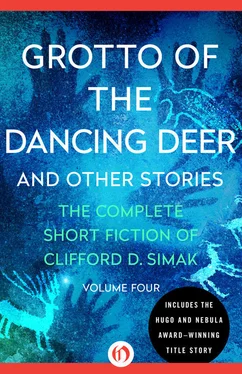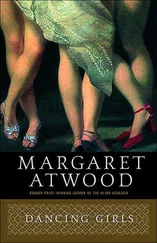“All right, Pancake,” I said. “Even with you cooking it, it probably wouldn’t be fit to eat.”
We wound up sitting at a table, looking at the sticks piled the center of it. Doc brought out a bottle and we all had a drink or two. Doc must have been considerably upset to share his liquor with us.
“It stands to reason,” said Frost, “that the sticks are good for something. If the cost of that building is any indication of their value, they’re worth a fortune.”
“Maybe the sticks aren’t the only things in there,” Hutch pointed out. “We just covered part of the first floor. The might be a lot of other stuff in there. And there are all those other floors. How many would you say there were?”
“Lord knows,” said Frost. “When you’re on the ground, you can’t be sure you see to the top of it. It just sort of fades away when you look up at it.”
“You notice what it was built of?” asked Doc.
“Stone,” said Hutch.
“I thought so, too,” said Doc. “But it isn’t. You remember those big apartment mounds we ran into in that insect culture out on Suud?”
We all remembered them, of course. We’d spent days trying to break into them because we had found a handful of beautifully carved jade scattered around the entrance of one of them and we figured there might be a lot of it inside. Stuff like that brings money. Folks back in civilization are nuts about any kind of alien art and that jade sure enough was alien. We’d tried every trick that we could think of and we got nowhere. Breaking into those mounds was like punching a feather pillow. You could dent the surface plenty, but you couldn’t break it because the strength of the material built up as pressure compressed the atoms. The harder you hit, the tougher it became. It was the kind of building material that would last forever and never need repair and those insects must have known they were safe from us, for they went about their business and never noticed us. That’s what made it so infuriating.
And material like that, I realized, would be just the ticket for a structure like the silo. You could build as big or as high as you had a mind to; the more pressure you put on the lower structure, the stronger it would be.
“It means,” I said, “that the building out there could be much older than it seems to be. It could be a million years or older.”
“If it’s that old,” said Hutch, “it could really be packed. You can store away a lot of loot in a million years.”
Doc and Frost drifted off to bed and Hutch and I sat there alone, looking at the sticks.
I got to thinking about some of the things that Doc was always saying, about how we were just a bunch of cut-throats, and I wondered if he might be right. But think on it as hard and as honest as I could, I couldn’t buy it.
On every expanding frontier, in all of history, there had been three kinds of men who went ahead and marked out the trails for other men to follow—the traders and the missionaries and the hunters.
We were the hunters in this case, hunting not for gold or slaves or furs, but for whatever we could find. Sometimes we came back with empty hands and sometimes we made a haul. Usually, in the long run, we evened out so we made nothing more than wages. But we kept on going out, hoping for that lucky break that would make us billionaires.
It hadn’t happened yet, and perhaps it never would. But someday it might. We touched the ghostly edge of hope just often enough to keep us thinking that it would. Although, I admitted to myself, perhaps we’d have kept going out even if there’d been no hope at all. Seeking for the unknown gets into your blood.
When you came right down to it, we probably didn’t do a bit more harm than the traders or the missionaries. What we took, we took; we didn’t settle down and change or destroy the civilizations of people we pretended we were helping.
I said as much to Hutch. He agreed with me.
The missionaries are the worst,” he said. “I wouldn’t be a missionary no matter what they paid me.”
We weren’t doing any good just sitting there, so I got up to start for bed.
“Maybe tomorrow we’ll find something else,” I said.
Hutch yawned. “I sure hope we do. We been wasting our time on these sticks of dynamite.”
He picked them up and on our way up to bed, he heaved them out the port.
The next day, we did find something else.
We went much deeper into the silo than we had been before, following the corridors for what must have been two miles or more.
We came to a big room that probably covered ten or fifteen acres and it was filled from wall to wall with rows of machines, all of them alike.
They weren’t much to look at. They resembled to some extent a rather ornate washing machine, with a bucket seat attached and a dome on top. They weren’t bolted down and you could push them around and when we tipped one of them up to look for hidden wheels, we found instead a pair of runners fixed on a swivel so they’d track in any direction that one pushed. The runners were made of metal that was greasy to the touch, but when you rubbed your fingers on them, no grease came off them.
There was no power connection.
“Maybe it’s a self-powered unit,” said Frost. “Come to think of it, I haven’t noticed any power outlets in the entire building.”
We hunted for some place where we could turn on the power and there wasn’t any place. That whole machine was the smoothest, slickest hunk of metal you ever saw. We looked for a way to get into its innards, so we could have a look at them, but there wasn’t any way. The jacket that covered the works seemed to be one solid piece without an apparent seam or a sign of a bolt or rivet.
The dome looked as though it ought to come off and we tried to get it off, but it remained stubbornly in place.
The bucket seat, however, was something else again. It was lousy with all sorts of attachments to accommodate the sitting surface of almost any conceivable kind of being. We had a lot of fun adjusting it in different ways and trying to figure out what kind of animal could have a seat like that. We got a bit obscene about it, I remember, and Hutch was doubled up laughing.
But we weren’t getting anywhere and we were fairly sure we wouldn’t until we could get a cutting tool and open up one of the machines to find out what made it tick.
We picked out one of them and we skidded it down the corridors. When we got to the entrance, we figured we would have to carry it, but we were mistaken. It skidded along over the ground and even loose sand almost as well as it did in the corridors.
After supper, Hutch went down to the engine room and came back with a cutting tool. The metal was tough, but we finally got at least some of the jacket peeled away.
The innards of that machine were enough to drive you crazy. It was a solid mass of tiny parts all hooked together in the damnedest jumble. There was no beginning and no end. It was like one of those puzzle mazes that go on and on forever and get no place.
Hutch got into it with both hands and tried to figure out how to start taking it apart.
After a while, he sat back on his heels and growled a little at it. “There’s nothing holding them together. Not a bolt or rivet, not even so much as a cotter pin. But they hang together somehow.”
“Just pure cussedness,” I said.
He looked at me kind of funny. “You might be right, at that.”
He went at it again and bashed a couple of knuckles and sat there sucking at them.
“If I didn’t know that I was wrong,” he said, “I’d say that it was friction.”
“Magnetism,” Doc offered.
“I tell you what, Doc,” said Hutch. “You stick to what little medicine you know and let me handle the mechanics.”
Читать дальше












